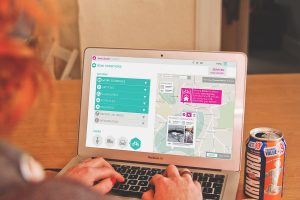Open Glasgow | 5 ways data can ensure a brighter future for the city

In 2013, Snook started a project for Open Glasgow and Future City Demonstrator programme. This week, we attended ‘People Make Glasgow Smart’: an event showcasing the progress of the demonstrator and future strategy for the city.
In 2013, Snook started a project for Open Glasgow and Future City Demonstrator programme. This week, we attended ‘People Make Glasgow Smart’: an event showcasing the progress of the demonstrator and future strategy for the city.
Snook’s challenge was to engage citizens in designing a future city together; advocating a culture shift towards a people-centred approach to service redesign and innovation. Today, Open Glasgow is using data to connect the city and redesign services around its citizens: ensuring a better future and quality of life. Here is how:
- Think data by default
Public sector mentality needs to change and adapt to a new way of thinking. Glasgow City Council is embracing digital and technology as a natural way of working. Service providers are learning how to approach issues using available datasets, uncover pain points and find opportunities for innovation. “We are data rich and management poor.” Despite the endless availability of rich data sets, the challenge is to develop mindset, skills and technologies to make sense of it all.
- Make data open and accessible
Information is open by default and Glasgow is at the forefront of Open Data movement in the UK. There is an army of people answering freedom of information requests. Glasgow is looking at ways to streamline the process. For example, using digital to automate it, increase efficiency, reduce costs and optimise resources. The challenge is finding the best way to engage with citizens and guide people towards the discovery of the power of data.
- Empower citizens with engaging data
“Data and knowledge can be the foundation of the future”. Here is how Open Glasgow is communicating data to citizens with different levels of digital literacy:
- Open Data catalogue, 370+ datasets from health and environment to social housing. Suitable for digital savvy citizens, developers, data analysts and data scientists.
- City Dashboard to create your own dashboard and see real time data in action. Medium digital knowledge, as simple as using Google Drive.

- Interactive Maps for citizens to see how data works in the city and discover datasets in their neighbourhoods or everyday life. Suitable for basic digital knowledge, easier than Google Maps.

- Interactive infographics showing how data is harnessed to generate insights and inspire targeted service redesign. Basic digital knowledge.
- Citizens engagement through community mapping in experiencing the city through data. Increase citizens digital skills, connect communities and discover new datasets together. For digital beginners, people of all ages and backgrounds.
- Combine shared datasets to predict the behaviour of the city
How to enter the system and encourage organisations to share datasets for the greater good? Open Glasgow played the role of a ‘Data Dealer’: approaching private and public sector organisations to show them mutual benefits of combined datasets and encouraging exchange. Data can generate powerful market insights. Connect stakeholders so they can deliver targeted and proactive services for citizens. For example, combining real time footfall data, road traffic and high street shops traffic allows to predict the ‘busyness of the city’ and adapt services accordingly.
Another example is tracking safe and dangerous parts of the city and analysing related datasets. This can help understand the conditions that lead to the rise of unsafe areas. By doing so, it’s possible to predict where the next dangerous hot-spot will be and act ahead of time to prevent its development.
Cross-sector connections and real time analytics can help predict the behaviour of the city and its citizens. This will guide the design of people-focused, future services.
- Stimulate innovation with Data
Open Glasgow is on a mission to harness local talent. To think of alternative methods to engage with individuals and organisations. Make of Glasgow a leader in innovation on a global scale. Hackathons for example, have proven to be a great way to foster entrepreneurship. A successful method to push new business development and generate innovative ideas fast.
Open Glasgow also focuses on green energy, education and technology. As well as services that can solve citizens issues (employment, housing, commuting etc.) before they arise. Today’s civic engagement strategy brings together public sector, data and academia. Expertise from each sector combined, are the key to research and innovate around cities.
An example is Strathclyde University Technology & Innovation Centre: connecting academics and industry to solve challenges in energy, health, manufacturing and other areas. Glasgow will soon be home of a new business accelerator centre, inspired by Google. This will help young, high-growth startups and connect educational institutions across the city. Creating a powerful network of entrepreneurs, business advisors and top facilities. This network, data and citizens will drive innovation for the city.